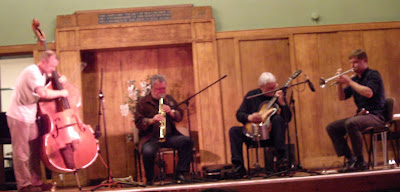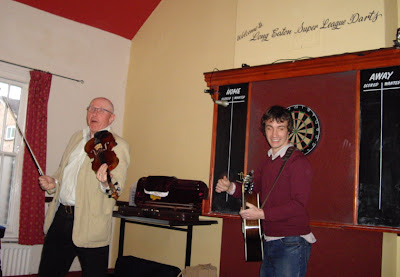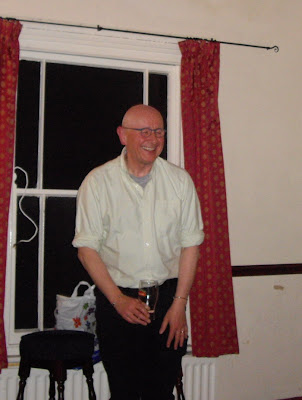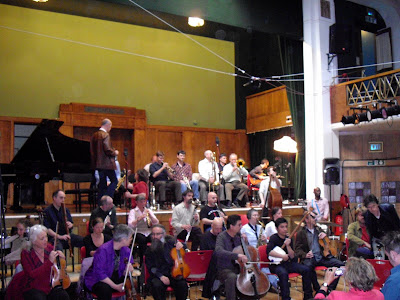
A long day and a glorious marathon of music...
Kick off at 2 pm – a duo with
Seymour Wright and Sebastian Lexer – alto saxophone and piano/electronics. I've seen Wright before a few years ago and didn't take to his assembling/dismantling of his instrument routine. That said – today I felt that I got what he was on about. Wright's a deadpan/zen character in a smart suit, sitting with his cohort Lexer in meditative silence before starting – crackles of sound from Lexer, Wright opening up on alto mouthpiece and various additions. Small, imperceptible breaths, spurts of air – it all sounds a bit precious until you go with it. This is musical exploration deep below the surface of the melodic/harmonic line, delving into the properties of discrete units of sound. Once the alto was assembled, Wright continued his forensic investigations of its physical properties, using a small radio inside the bell, a tambourine balanced on the same as Lexer produced complementary sounds from the piano and further processed through his rig. A riveting performance – visual as well as aural. I detect – though I could be wrong – a wry humour behind the mask. After all, he is one of us provincials, from Derby way. We do wry... Great start to the afternoon...
A trio next –
Ross Lambert/Paul Abbott/Jerry Wigens. Guitar/electronics/clarinet. I enjoyed it but thought it a little disconnected and a trifle dry at times. One thought I had about the festival as a whole was how the electronics side never really seemed fully integrated with the conventional instruments, apart from a couple of exceptions. Here, Lambert and Wigens intereacted fluently throughout, but Abbott seemed more colour than equal contribution - however, this could have been due to my position off to the side of the hall...
John White and John Lely – the old guard and the new. Sat at a couple of tables with their electronic produce in front of them, it struck me rather facetiously (as ever) that there is a thesis somewhere for an earnest young academic to write – on the influence of church jumble/bring and buy sales on laptop/electronic music. (Might get them a job on
The Wire...). Two parallel streams of sounds, some short wave radio interference which provided a couple of laughs. Something about this seemed – well, it was interesting, as was everything on the festival, but a bit flimsy... academics having fun... nothing visceral...
After a short break – fire music of the first order. A stunning duo of
John Edwards and John Butcher, gonzo bass player supreme and saxophones - tenor and soprano. Edwards is a virtuoso, taking his instrument way beyond its conventional range (caveat: whatever that might be these days), slapping it, stroking, pummelling, jamming his bow into the strings, producing a massive array of sound that always hard drives any combo he is part of. Butcher I had taken for a more cerebral player, used to his multi-tracked albums rather than his live work. On storming form here – they jacked up the energy levels and went down accordingly well with the enthused audience.
A duo –
Ute Wasserman and Aleks Kolkowski. Now this really was something different. When I clocked the musical saw I thought about heading for the bar as I hate glissando-ey wobbley instruments (never could dig the theremin for the same reason). Luckily I let curiosity get the better of prejudice and witnessed one of the highlights (for me) of the festival. Kolkowski, bowing on the saw and on a phono-fiddle (an instrument I have not seen since I was a street musician way back and encountered regularly an old guy who played one down Marble Arch subway) completely transcended his instruments' vaudeville connotations. Wasserman, a tall woman, stood straight and sang/produced vocal sounds starting from pure, almost operatic tones (she has that sort of range and technique) that were bent and roughed up into more granular areas, subtly punctuated with additional small bird callers. Without any electronic aid – apart from the microphones - they brought forth amazing music of condensed purity. Bottleneck phonofiddle as well, I kid you not...
More fire:
Marc Saunders/Pat Thomas/John Coxon. Starting on smashed piano chord/clusters whacked out of the Bosendorfer by Thomas as Saunders rattled up fast-wristed salvos across his kit, spiced with Coxon's high-octane electric guitar noise. The guitarist used his instrument for colouration, coming from a different genre he grasped how to interact with the speed of the other two musicians, wrenching amplified shrieks and splashes into appropriate shapes to match their lines. Maybe not always successfully, but a brave stab...
The evening session. First up: John Russell's latest incarnation of
QuaQua – a seven piece tonight, including Phil Minton... I almost left for the bar again – there are not many vocal improvisers who do it for me anyway and Minton definitely is not one of them. Luckily in a group this size - piano and added electronics (again), violin, percussion, bass, alto, and Russell's guitar, there was plenty to hold the attention away from yelping by numbers. Stirring stuff – at times when they got stoked up they seemed to hit a spiky fragmented almost-groove – not in a jazz/freejazz even sense, but something intrinsic perhaps to Brit/European improvisers who have played together so much down the years, a collective energy field of spiky movement hard-driven by Turner's percussion. Russell a bit low in the overall mix – his sound concept of dry, dusty scrapes, sharply strummed notes and skittering runs performed on an old archtop guitar is obviously deliberate but with little carry can get tonally swamped. Pity, because he is a fascinating guitarist. (Somewhere I have some old radio shots of him in a trio with John Butcher and Phil Durrant where the guitar cuts through much more – must dig those cassettes out of the garage). A small beef, however – great set...
Lol Coxhill solo... I first heard Lol back in the old days when he was busking round the West End – as I was. I would often go down the road and listen – one of our national treasures. Tonight, in relaxed form playing to the home crowd, as it were... Lol manages to go in and out seamlessly, his improvisations following a logic that bends occasional timbral effects into the melodic flow without seeming contrived. He finished on a standard – shock horror! 'Lover Man,' a beautiful rendition but with one eye on the clock – he suddenly stopped in mid chorus. Courtesy for the following musicians – and good stagecraft. Still a marvellous freshness to his playing after all these years...
A trio:
Alan Wilkinson/John Bissett/James Dunn – baritone and alto saxophones/guitar/electronics. Blistering stuff – Wilkinson I have never seen live and he gave of his all – fast and furious and shading it on the alto horn, I thought. Bissett was a new name to provincial me – I would like to hear more, he struck me as having an interesting take on post-Bailey guitar. A powerhouse set – but again, it struck me that the electronics of James Dunn were interesting but just adding colour rather than being more deeply integrated into the whole. I kept thinking of someone with the visceral live intensity of
Aaron Dilloway, wondered how he would fit into these ensembles... but a good segment closer, all the same.
The end of a perfect day... A superb duo to kick off the last section,
Tony Marsh and Alexander Hawkins, veteran drummer alongside up and coming young pianist. Hawkins started in lyrical mood, upping his game into wilder crashing smashes and scampering lines – a little repetitive in places, perhaps, with the top of keyboard flurries, but overall exciting stuff. Marsh was superb, visibly enjoying himself throughout. Went down a storm...
To the last set –
left to right, John Edwards, Evan Parker, John Russell and Peter Evans – bass, tenor/soprano saxophone, guitar and trumpet. A heavyweight band, although I noticed how Parker pulls back in these situations, playing for the ensemble rather than allowing his formidable technique to dominate. I would like to have heard a bit more of him, as one of my favourite musicians, but the band came first... Similar point as above concerning Russell's guitar, although it was fractionally more audible than with Quaqua, I still wanted to hear it more clearly. But the overall timbral balance was pretty good, considering Edwards edged into Russell's sonic field occasionally. Evans was a revelation, another name I don't know, his supple trumpet, open and muted, flying alongside Parker in places with a dizzying tightrope brilliance. You really didn't want them to stop, even after hours of music.
But they obviously had to...
Last thoughts. So much good and varied music... Congratulations to all who managed to put this event on, musicians playing for love rather than financial reward and all the backstage organisers, comperes, soundcrew etc. In hard times – and made harder no doubt with the bloated and bungled Olympic budget snaffling lots of lottery cash from putative Arts funding – they deserve a big round of cyber applause...
Evan Parker at the end mentioned that perhaps next year, there will be a three day event rather than two. I hope so...














